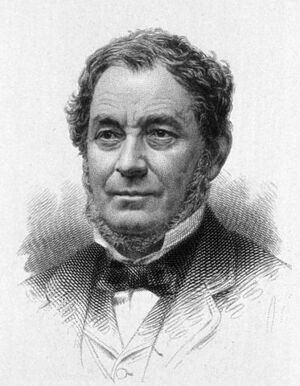Robert Bunsen (nonfiction): Difference between revisions
Jump to navigation
Jump to search
(Created page with "'''Robert Wilhelm Eberhard Bunsen''' (/ˈbʌnsən/; German: [ˈbʊnzən]; 30 March 1811 – 16 August 1899) was a German chemist. He investigated emission spectra of heated e...") |
No edit summary |
||
| Line 1: | Line 1: | ||
'''Robert Wilhelm Eberhard Bunsen''' (/ˈbʌnsən/; German: [ˈbʊnzən]; 30 March 1811 – 16 August 1899) was a German chemist. | [[File:Robert_Bunsen.jpg|thumb|Robert Wilhelm Eberhard Bunsen.]]'''Robert Wilhelm Eberhard Bunsen''' (/ˈbʌnsən/; German: [ˈbʊnzən]; 30 March 1811 – 16 August 1899) was a German chemist. | ||
He investigated emission spectra of heated elements, and discovered caesium (in 1860) and rubidium (in 1861) with the physicist [[Gustav Kirchhoff (nonfiction)|Gustav Kirchhoff]]. | He investigated emission spectra of heated elements, and discovered caesium (in 1860) and rubidium (in 1861) with the physicist [[Gustav Kirchhoff (nonfiction)|Gustav Kirchhoff]]. | ||
Revision as of 16:51, 16 November 2017
Robert Wilhelm Eberhard Bunsen (/ˈbʌnsən/; German: [ˈbʊnzən]; 30 March 1811 – 16 August 1899) was a German chemist.
He investigated emission spectra of heated elements, and discovered caesium (in 1860) and rubidium (in 1861) with the physicist Gustav Kirchhoff.
Bunsen developed several gas-analytical methods, was a pioneer in photochemistry, and did early work in the field of organoarsenic chemistry.
With his laboratory assistant, Peter Desaga, he developed the Bunsen burner, an improvement on the laboratory burners then in use.
The Bunsen–Kirchhoff Award for spectroscopy is named after Bunsen and Kirchhoff.
In the News
Fiction cross-reference
Nonfiction cross-reference
External links:
- Robert Bunsen @ Wikipedia
Attribution:
